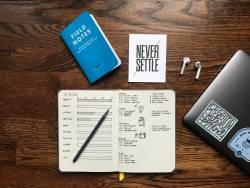
How to Stop Wasting Your Life: 42 Simple Ways
Lessons from Four Thousand Weeks by Oliver Burkeman

Do you realize that 4000 weeks is the amount of time you may have on this planet? (if you have 80 years to live)
Should your goal really be “getting everything done”?
Is “doing everything efficiently” the way to go?
Is there a better way to manage the time you have?
“The problem with trying to make time for everything that feels important is that you definitely never will.” - Oliver Burkeman
In Oliver Burkeman’s thought-provoking book Four Thousand Weeks: Time Management for Mortals, he wrote about some life-changing ideas on how to actually spend your time, given the fact that you will never have enough time to do all the things that you feel are important.
Let’s now look at his best ideas:
1. Accept that time is limited, and no hacks can help you get everything done
Having limited time is not the problem. The problem is the belief that you can learn to master your time management techniques to a point where you can get everything done and that will result in a happy life. Just by accepting that time is limited and getting everything done is impossible should already be able to give you a feeling of relief.
2. Don’t let FOMO (fear of missing out) dictate how you spend your time
Don’t build a startup around a trendy idea only because you see all other people are doing it. It could end up wasting years of your precious life. When you see your friends, on social media, posting pictures of some cool places they have gone to, or some seemingly tasty food they have eaten, don’t just blindly spend your time doing something similar. It’s your life.
3. Time management techniques may help, just don’t expect them to solve big problems like stress and burnout
Time management techniques like pomodoro techniques and time blocking may still help. A lot of techniques help make our days more organized if you can find the right ones that suit yourself. But these techniques can’t help you handle stress and burnout.
In a lot of cases, stress and burnout happens when you have been very busy and got really tired and end up finding yourself doing things that are not really that important to you. Make sure you don’t use time management techniques to more efficiently and massively do things that aren’t meaningful to you.
4. Understand that the faster you do something, the more of that something you have to do
The faster you reply to emails, the more emails you are going to get. It’s the same for a lot of things: your messages, your social media replies. Ask yourself, “Is doing more and more of this something meaningful to you?”.
5. Be aware that convenience isn’t always the best
You have to be aware that ordering food with one click on your phone can be convenient sometimes, but it can also take away your chance to interact with a real person. The point is not about whether to use an app or not. The point is you should be more aware of the fact that doing things the most convenient way may not always be the better way.
In the book, Burkeman had a great example about “manually writing on and mailing a real birthday card” vs “automatically sending a digital birthday card”. That’s a great example of how the effort, or the inconvenience, actually strengthens relationships.
6. Allow yourself to have “unproductive” hours
If you believe that every minute you spend during a day has to be in a so-called productive way, meaning you have to get some work done as efficiently as you can, you would be really stressed. You would find yourself complaining every time you do the dishes, thinking that you are supposed to be doing work earning x amount of dollars per hour. Who says you are supposed to do that? The media? The books? The culture? Can’t you view washing dishes as a form of slowing down your busy life.
7. Treasure your present moment because tomorrow is not guaranteed
Learning how to live in the present moment is probably the gift you can give yourself. There are no problems with planning and setting goals, as long as you understand the importance of the present moment and understand that you are just making your best guess. Read the article The Mind is Its Own Place: Lessons from Tolle’s Power of Now to learn more about how to live in the present moment.
8. Do what’s truly important to you everyday, no matter how little of it
“There is no moment in the future when you’ll magically be done with everything and have loads of free time. . . . Build a system where you pay yourself first (with time as well as money) and then trust the system.” - Jessica Abel, (article) How to escape panic mode and embrace your life-expanding projects
This tip is actually one of the core teachings in the famous book The 7 Habits of Highly Effective People by Stephen Covey. That's proof that there are still some mainstream time management techniques that are useful, if you use them correctly and you are deeply aware that your time is limited.
Stephen Covey taught people about spending more time doing “important but not-urgent” things. The most important thing is not necessarily the most important task at work. It can be doing a creative side-project, improving a relationship, or developing a hobby. Things that don’t necessarily look important in a traditional sense but things that “really matters to you”.
9. Limit the amount of tasks you are currently work on
If you have too many “in-progress” tasks on hand, you would conveniently jump to task B when task A gets tough or boring. And by doing a lot of unnecessary switching between tasks, you are not getting things done and that may even result in stress. Try to limit your “in-progress” tasks to 1, 2, or 3. Experiment and see what works best for you.
10. Limit the time for doing kind-of-important things
There are lots of things in life that you may think are cool or fun to do. Those are the seemingly important things that can use up a lot of your time. Those seemingly important things can be good things. But to do great things, things that are truly important and meaningful to you, you have to limit the time for doing those good things. To find out what is truly important to you, try to use the regret minimization framework, an idea made popular by Amazon's Jeff Bezos.
11. Realize that you procrastinate because you unconsciously want to avoid the risk of failing
One of the biggest reasons for you not doing what is truly important is that you unconsciously try to avoid pain, the pain of failing to achieve your dream. If you can realize that, you get a chance to meet the fear face-to-face and get work done despite the fear.
12. Enjoy the process and live with the result
If you can learn to enjoy the process of doing what you really love doing, you are always winning. To be satisfied, you don’t need other people’s applause and you don’t need to generate money. It’s not that they are not good. You just don’t need them to feel satisfied.
13. Settling to doing something is unavoidable
Since your time is finite, you don’t have time for everything. Settling to do a 5-year project can be scary because it makes you think that you will have to miss out on doing a lot of other great things in the next 5 years. So, the alternative is to keep searching for short-term jobs in the next 5 years.
But constantly searching for short-term jobs is just another version of settlement. That’s right. You are committed to constantly searching. Just be aware that settling is unavoidable and make the type of settling that suits you.
Don’t believe that settling means not living your life to the fullest.
14. Limit your time on social media platforms and news site
Social media, news sites and things of that nature are machines that are built to make you pay attention to the wrong things. They make you focus on news that you shouldn’t pay too much attention to and make you want to buy things that you don’t really need.
15. Realize that getting distracted is unavoidable
You unconsciously want to escape from doing tasks that make you feel like a limited person. That’s one of the biggest reasons why you visit websites and social media where you can seemingly do unlimited things. Having the awareness of that gives you a better chance to reduce your time spending on those places.
16. Accept that any task you plan to do is going to take longer than you expect
Douglas Hofstadter is a scientist famous for his idea: Hofstadter’s law.
Hofstadter’s law: Any task that you plan to do is going to take longer than you expect, even when you are fully aware of the existence of Hofstadter's law.
Here’s an example of Hofstadter’s law. If you plan to spend 2 hours writing a blog post and that you are aware of Hofstadter’s law, you probably would allow yourself to use 4 hours and you would think it’s a very safe estimation. The result is likely that you will spend more than 4 hours, the amount of time that you have adjusted due to your awareness of Hofstadter's law.
Just accept the fact that things are going to take longer than you expect. That awareness can help you live with less stress.
17. Plan but don’t expect planning can reduce your anxiety
Planning is a useful tool. It can help you increase the chance of certain things happening in the future. The problem is that, by doing a lot of planning, you believe that the result is going to be great. You tend to forget that plans are just tools after doing a lot of planning. You are stressed when the result doesn’t match your expectation. Remember that things can go wrong no matter how much planning you do. Plan but don’t expect.
18. Enjoy the present moment by not putting too much attention to the future
In the book, Burkeman described his epiphany when he had a new-born boy. He realized that he was focusing too much on how to raise his son so that his son would become a successful man in the future.
He explained that it’s important to pay a certain amount of attention to the future such as applying to pre-school. But he realized that it’s not worth it to put too much attention to the future to a point that made him forget to enjoy the present moment.
He realized how precious it is to have the chance to watch, care for, and play with his new-born son, in the present moment. Those moments are the best gifts in the world.
19. Realize that being in the present moment is your only choice
“The life of this moment has no outside.” - Jay Jennifer Matthews, Radically Condensed Instructions for Being Just as You Are
Although there are ways like mindfulness and meditation that can help you live “more fully in the present”, Burkeman suggested in the book that the best way to do so is to simply realize that “you never had any other option but to be here now”.
20. Enjoy your leisure time without calculating how much it would benefit your work or your future
If you spend your leisure time focusing on how much it can help you refresh your mind and body for work tomorrow and how effective it can help you build your network, then you are not really enjoying your leisure time. The purpose of having leisure time is to have fun, but not to make you a better person at work.
21. Have some activities everyday that you actually enjoy the process of doing
When you look closely at what you do daily, you would probably realize that you do most of them for the sake of having a better future. You work for the sake of having a more wealthy future. You take a course for the sake of getting a better job later. It’s almost unavoidable that we do a lot of things for the sake of having a better future. To balance it out, spend some time each day doing things that are not future-focused. Do something that you want to do mostly because you enjoy the process of doing it.
For example, for parents, thinking about what activities can benefit their children’s future is quite natural and it can be beneficial. But the point is that it’s important to also spend some time playing with the children, just for the sake of playing.
22. Spend time on hobbies and don’t feel guilty about it
“It's hard to suck at something if you don't have a sense of play, and if you don't know how to play, you'll never suck at something.” - Karen Rinaldi, It's Great to Suck at Something
Regarding things that you actually enjoy the process of doing, a lot of those things can be classified as hobbies. If you love doing puzzles, just do it. There’s nothing wrong with spending an hour on doing puzzles everyday if that makes you enjoy your life. It’s important to not worry about being average or even bad at doing puzzles. Also, you don’t have to turn all of your hobbies into businesses. Don’t just create an online puzzle shop just because you love puzzles.
Burkeman mentioned that Karen Rinaldi, author of It's Great to Suck at Something, experienced patience, humility and freedom when she spent time surfing and allowed herself to suck at it.
23. Understand that getting things done faster does not result in happiness
If you believe that happiness depends heavily on how fast you can get things done, you would likely want to do things even faster and faster to chase more happiness. Unfortunately, that would result in giving you anxiety instead of happiness.
24. Accept that things take the time they take
If you want to do things properly, they take time, and there’s a limit to how much you can speed things up. Reading books takes time. There are techniques that allow you to read books slightly faster. However, if you have to force yourself to read a 300-page book in an hour, you are not reading it. You are skimming it. The point is not that skimming a book is wrong. There are times when you want to do that. The point is that you have to give yourself hours to actually read a 300-page book and be okay with that.
25. Be patient when trying to quit a bad habit or leave a bad situation
Leaving a bad situation or quitting a bad habit takes time. It’s rare to have a big change overnight. Do things one step at a time. Focus on what you should do at the present moment.
26. Be patient and listen
Listening takes a lot of patience. Learn to listen to your family, friends and anyone you care about. When there’s a disagreement, it’s hard to let others finish their sentences before you start your arguments, because you want to feel more in control. Letting other people speak makes you feel like you are not the one in control. But do you want to feel in control? Or do you want to have good relationships with people that are important to you?
27. Don’t quit something because of the lack of patience
In the process of building a business or working on a creative project, it’s sometimes easier to simply quit because you lack the patience to see how things develop. It’s okay to quit something but don’t let the lack of patience dictate your decision.
28. Improve patience by accepting that having problems is normal
If you can accept that having problems is normal, you should be able to allow some problems not being fixed quickly and some problems not being fixed at all.
29. Improve patience by splitting your long-term projects into small doses of daily work
If you want to write a book and you are having trouble writing 3 hours a day, then why don’t you just write one hour a day and let it take you one year or two years?
30. Improve patience by not blindly chasing something seemingly new or unique
Sometimes, it can be tempting to quit doing something in order to do something that looks more unique and new. But there is nothing that is truly unique or new. By understanding that, you may be able to avoid making some unnecessary changes.
On the other hand, staying at the same thing gives you the chance to experience something that you only have by staying at that same thing. That doesn’t mean it’s always good to stay at the same thing all the time or try “new” things all the time. It means that both can be good experiences and don’t make decisions solely based on “uniqueness” or “newness”.
31. Spend some of your time with others, even if it means you would lose some control of your schedule
Time is valuable when you share some of it with others. It’s not that much fun to play basketball alone. It’s certainly easier to schedule a one-person basketball game, but what’s the point? Find your right balance between the amount of time you want to spend alone and the amount of time you want to spend with others. Don’t worry about losing some control of your schedule for important people in your life.
32. Sync your time off with your family and friends
If you are a freelancer or a self-employed person, you probably have a much more flexible schedule. Maybe you like working on Saturdays and Sundays and you like to start work late in the afternoon and finish work late at night. In some ways, that can give you a lot of fun. For example, you can have the freedom to go shopping on a Monday morning when the shopping mall isn’t crowded at all. The problem is that when your family and friends have their time off, you are working.
There are certainly situations where completely syncing schedules doesn’t work, but doing that partially may already be able to make you much happier. Try your best to regularly schedule time to be together with your family and friends. Happiness can be as simple as having dinner with your family and hanging out with your best friends.
33. Realize that you and your problems are small in this big universe
By realizing that you are no bigger than specks of dust in the universe, you would also realize that your problems aren’t any bigger. Have this awareness and you will be able to have more patience towards solving problems. You will also be able to make yourself more willing to lose some control of your schedule. Most importantly, you won’t feel as stressed when you can’t get things done as quickly as you want, because all tasks are small in the universe.
34. Realize that you are spending your time well if what you do make things slightly better
You don’t have to be the one who invents airplanes to spend your time well. If you are cooking a meal for your kids, that’s a great way to spend your time as you are making them slightly healthier. If you are an employee of a company, you may be only contributing slightly to a product that slightly helps some people, but you can still be confident that you have spent your time well because you have caused a slight improvement in the universe.
It’s not that you can’t try to do big things. It’s just that you have to realize you have the choice. Achieving something big isn’t the only way to live.
35. Realize that problems can only be unbearable when you think there must be solutions
Not only that it will save you time, but that it will feel less stressed, when you realize that sometimes there are no perfect solutions, sometimes there are no solutions at all. There is no way to finish all tasks that seem worth doing. The best you can do is select those that matter the most to you and accept the fact that they are going to take the time they take.
36. Choose the path that makes you grow even when it’s the uncomfortable one
“Ask yourself of every dilemma, every choice, every relationship, every commitment, or every failure to commit: Does this choice diminish me, or enlarge me?” - James Hollis, What Matters Most: Living a More Considered Life
“Choose uncomfortable enlargement over comfortable diminishment whenever you can.” - Oliver Burkeman
When you have a big decision to make, don’t just ask yourself which option would make you happier. You would likely find yourself quitting a lot of things that you shouldn’t have. Ask yourself which option is going to make yourself grow, in a way that you want to grow. Sometimes, quitting is the right choice. Sometimes a new option is right. Sometimes, being an employee is the right choice. Sometimes building a business is right. Let the question “Does this choice diminish me, or enlarge me?” guide you.
37. Accept who you are and spend time on what you love
If you love playing the piano, spend some time playing it everyday. You don’t necessarily need to be good at it. You don’t need to make money with it. Maybe you can’t play as much as you would like since you need a day job to make a living. But if you try, it’s probably not that hard to play half an hour or an hour a day.
38. Don’t hold back doing something because you feel like you are not ready
Nobody is ever totally ready. If you want to start a business and you don’t do it because you think you will need to work 5 more years as an employee in the industry, save a hundred thousand dollars, read 50 more books, you will never do it. Do what you want to do, now. Figure out your way.
39. Allow yourself to do things that you won’t be able to see the results
There are things to do in life that may be meaningful to you but that you don’t have the chance to see the end results. These may include things like charity and community-building. By allowing yourself to do things that you don’t see results, you open up a set of things that actually matters to you.
40. Realize that you never need to feel completely secure
Not being able to completely control time, and not being able to get everything done can make you feel insecure or uncomfortable. But who says that you need to feel completely secure to live your life well. Don’t spend time doing things solely because you want to reach a state of complete security. There is no such state anyway.
For example, imagine that there is a thing to do that really matters to you and there is another thing that seems to be kind of a good idea to do. To make yourself feel more secure, you may want to do both things so that you won’t have to miss out. But that could make you stressed out and cost you some quality time, like time with your family and friends.
Be comfortable with spending most of your time doing things that really matter to you, while ignoring the seemingly good ideas.
41. Give up the hope of completely controlling time in order to live better
Keep things simple. If there are tools that help you organize your day better, use them. But don’t endlessly optimize your time management system. You will never be able to completely control time. You will never be able to get everything important done. Accept this fact to live a more meaningful and less stressful life.
42. When a generous thought comes, act right away
When you suddenly have the thought of saying something nice to your family or saying sorry to a friend, act right away. Or you likely won’t do it. A lot of times, you don’t act right away because you want to stick to your schedule. But how good is your time management if you can’t find time to act generously?
Final Thoughts
You can’t finish working on everything that seems to be important to you. Be wise and pick those things that really matter to you. More than that, accept that you may not even be able to finish the really important things. Be okay with it and you will live a more meaningful and less stressful life.
To learn more about how to manage your time wisely, read Oliver Burkeman’s life-changing book Four Thousand Weeks: Time Management for Mortals.













